Acts & Thessalonians: Paul's 2nd Journey - New Testament Survey
VerifiedAdded on 2023/04/22
|37
|11338
|455
Homework Assignment
AI Summary
This assignment solution focuses on Paul's second missionary journey as detailed in Acts 15:36-18:22 and 1 & 2 Thessalonians. It addresses questions about Paul's disagreement with Barnabas, Timothy's inclusion in the journey, divine guidance in Macedonia, Lydia's conversion, the Philippian jailer's conversion, Paul's ministry in Thessalonica and Berea, and his time in Athens. The solution also covers Paul's teachings and ethical conduct, the challenges he faced, and his interactions with different philosophical schools. The assignment concludes with questions about Paul's ministry in Corinth and reflections on the application of these biblical truths to contemporary life. Desklib provides past papers and solved assignments for students.
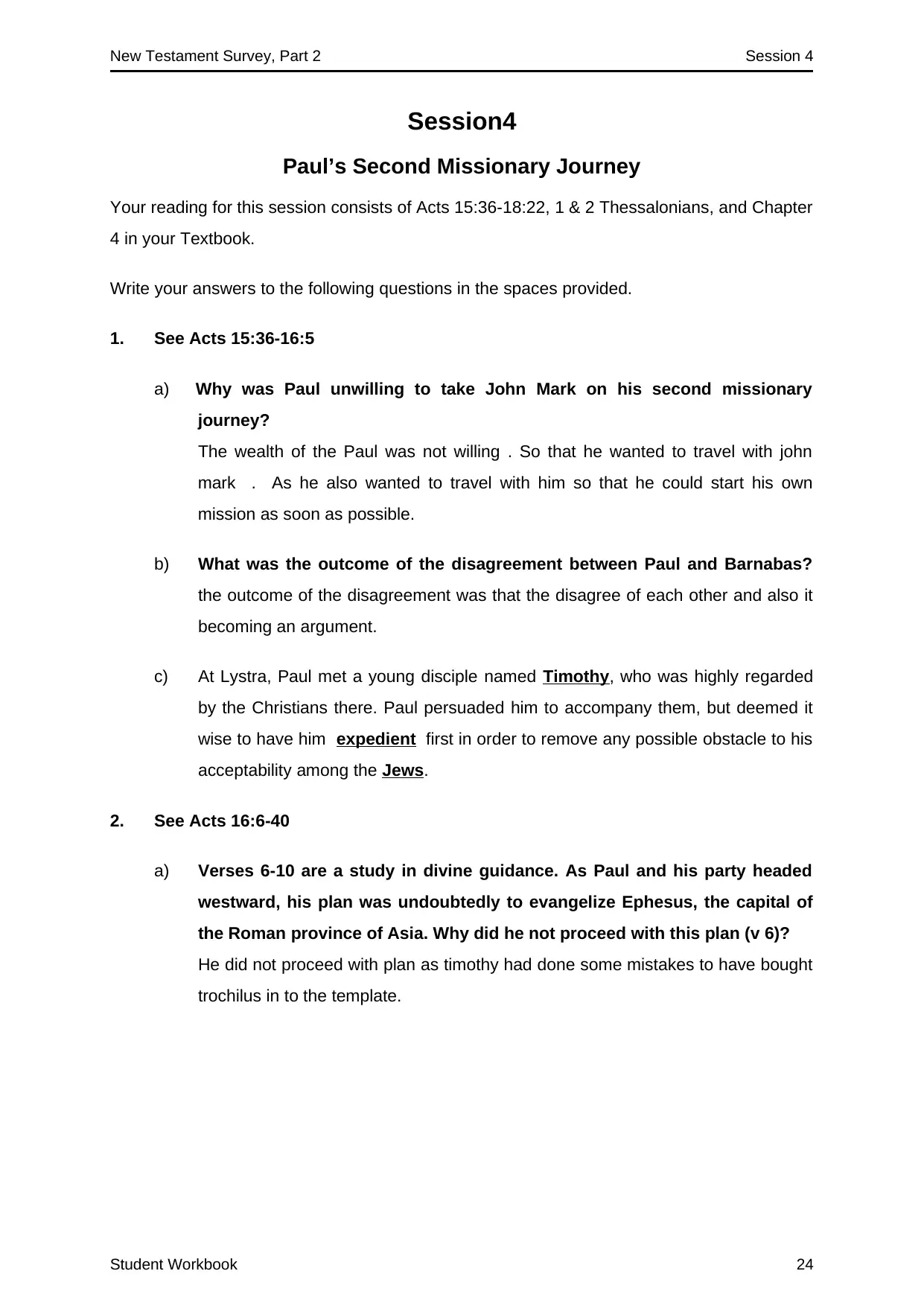
New Testament Survey, Part 2 Session 4
Session4
Paul’s Second Missionary Journey
Your reading for this session consists of Acts 15:36-18:22, 1 & 2 Thessalonians, and Chapter
4 in your Textbook.
Write your answers to the following questions in the spaces provided.
1. See Acts 15:36-16:5
a) Why was Paul unwilling to take John Mark on his second missionary
journey?
The wealth of the Paul was not willing . So that he wanted to travel with john
mark . As he also wanted to travel with him so that he could start his own
mission as soon as possible.
b) What was the outcome of the disagreement between Paul and Barnabas?
the outcome of the disagreement was that the disagree of each other and also it
becoming an argument.
c) At Lystra, Paul met a young disciple named Timothy, who was highly regarded
by the Christians there. Paul persuaded him to accompany them, but deemed it
wise to have him expedient first in order to remove any possible obstacle to his
acceptability among the Jews.
2. See Acts 16:6-40
a) Verses 6-10 are a study in divine guidance. As Paul and his party headed
westward, his plan was undoubtedly to evangelize Ephesus, the capital of
the Roman province of Asia. Why did he not proceed with this plan (v 6)?
He did not proceed with plan as timothy had done some mistakes to have bought
trochilus in to the template.
Student Workbook 24
Session4
Paul’s Second Missionary Journey
Your reading for this session consists of Acts 15:36-18:22, 1 & 2 Thessalonians, and Chapter
4 in your Textbook.
Write your answers to the following questions in the spaces provided.
1. See Acts 15:36-16:5
a) Why was Paul unwilling to take John Mark on his second missionary
journey?
The wealth of the Paul was not willing . So that he wanted to travel with john
mark . As he also wanted to travel with him so that he could start his own
mission as soon as possible.
b) What was the outcome of the disagreement between Paul and Barnabas?
the outcome of the disagreement was that the disagree of each other and also it
becoming an argument.
c) At Lystra, Paul met a young disciple named Timothy, who was highly regarded
by the Christians there. Paul persuaded him to accompany them, but deemed it
wise to have him expedient first in order to remove any possible obstacle to his
acceptability among the Jews.
2. See Acts 16:6-40
a) Verses 6-10 are a study in divine guidance. As Paul and his party headed
westward, his plan was undoubtedly to evangelize Ephesus, the capital of
the Roman province of Asia. Why did he not proceed with this plan (v 6)?
He did not proceed with plan as timothy had done some mistakes to have bought
trochilus in to the template.
Student Workbook 24
Paraphrase This Document
Need a fresh take? Get an instant paraphrase of this document with our AI Paraphraser
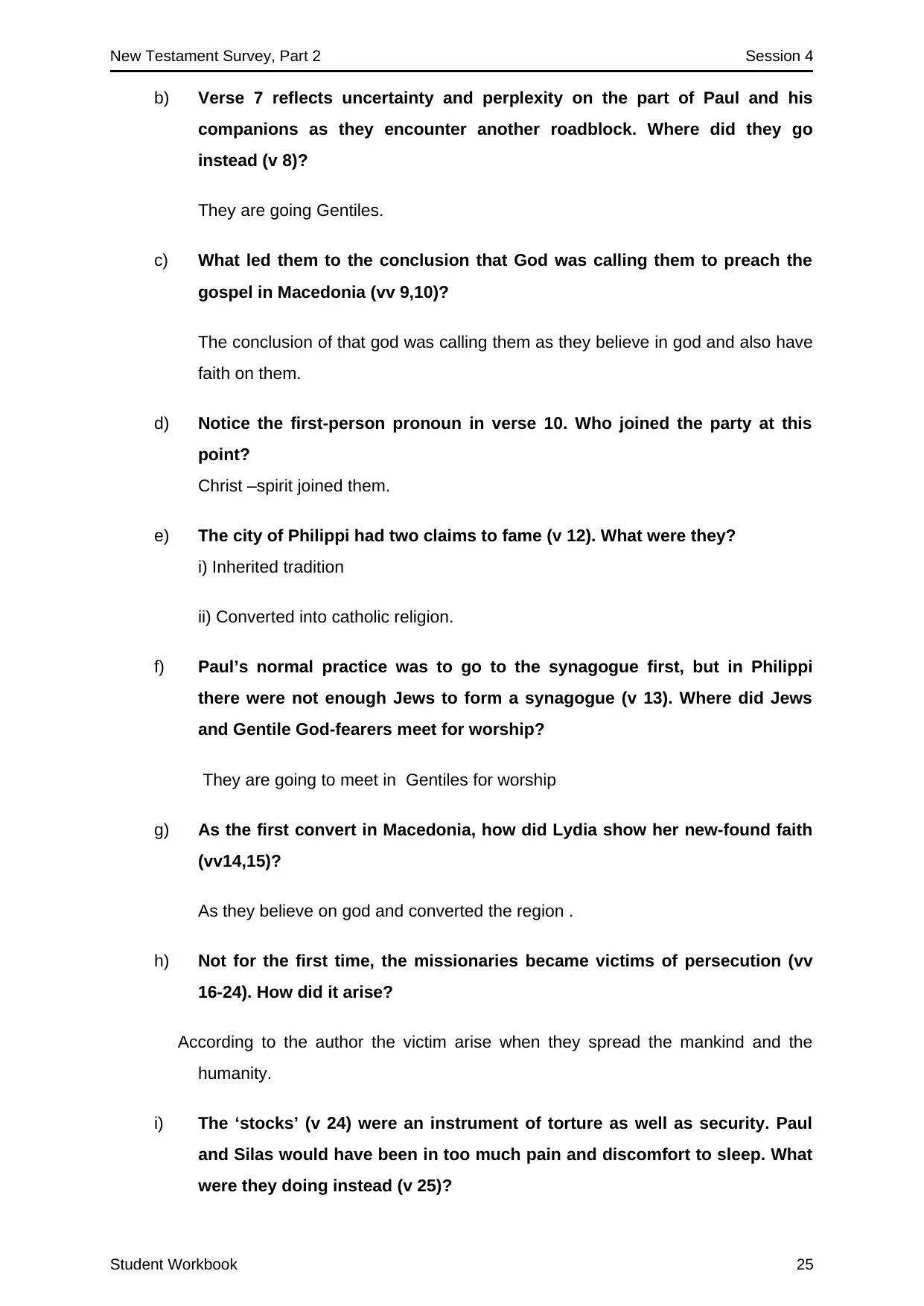
New Testament Survey, Part 2 Session 4
b) Verse 7 reflects uncertainty and perplexity on the part of Paul and his
companions as they encounter another roadblock. Where did they go
instead (v 8)?
They are going Gentiles.
c) What led them to the conclusion that God was calling them to preach the
gospel in Macedonia (vv 9,10)?
The conclusion of that god was calling them as they believe in god and also have
faith on them.
d) Notice the first-person pronoun in verse 10. Who joined the party at this
point?
Christ –spirit joined them.
e) The city of Philippi had two claims to fame (v 12). What were they?
i) Inherited tradition
ii) Converted into catholic religion.
f) Paul’s normal practice was to go to the synagogue first, but in Philippi
there were not enough Jews to form a synagogue (v 13). Where did Jews
and Gentile God-fearers meet for worship?
They are going to meet in Gentiles for worship
g) As the first convert in Macedonia, how did Lydia show her new-found faith
(vv14,15)?
As they believe on god and converted the region .
h) Not for the first time, the missionaries became victims of persecution (vv
16-24). How did it arise?
According to the author the victim arise when they spread the mankind and the
humanity.
i) The ‘stocks’ (v 24) were an instrument of torture as well as security. Paul
and Silas would have been in too much pain and discomfort to sleep. What
were they doing instead (v 25)?
Student Workbook 25
b) Verse 7 reflects uncertainty and perplexity on the part of Paul and his
companions as they encounter another roadblock. Where did they go
instead (v 8)?
They are going Gentiles.
c) What led them to the conclusion that God was calling them to preach the
gospel in Macedonia (vv 9,10)?
The conclusion of that god was calling them as they believe in god and also have
faith on them.
d) Notice the first-person pronoun in verse 10. Who joined the party at this
point?
Christ –spirit joined them.
e) The city of Philippi had two claims to fame (v 12). What were they?
i) Inherited tradition
ii) Converted into catholic religion.
f) Paul’s normal practice was to go to the synagogue first, but in Philippi
there were not enough Jews to form a synagogue (v 13). Where did Jews
and Gentile God-fearers meet for worship?
They are going to meet in Gentiles for worship
g) As the first convert in Macedonia, how did Lydia show her new-found faith
(vv14,15)?
As they believe on god and converted the region .
h) Not for the first time, the missionaries became victims of persecution (vv
16-24). How did it arise?
According to the author the victim arise when they spread the mankind and the
humanity.
i) The ‘stocks’ (v 24) were an instrument of torture as well as security. Paul
and Silas would have been in too much pain and discomfort to sleep. What
were they doing instead (v 25)?
Student Workbook 25
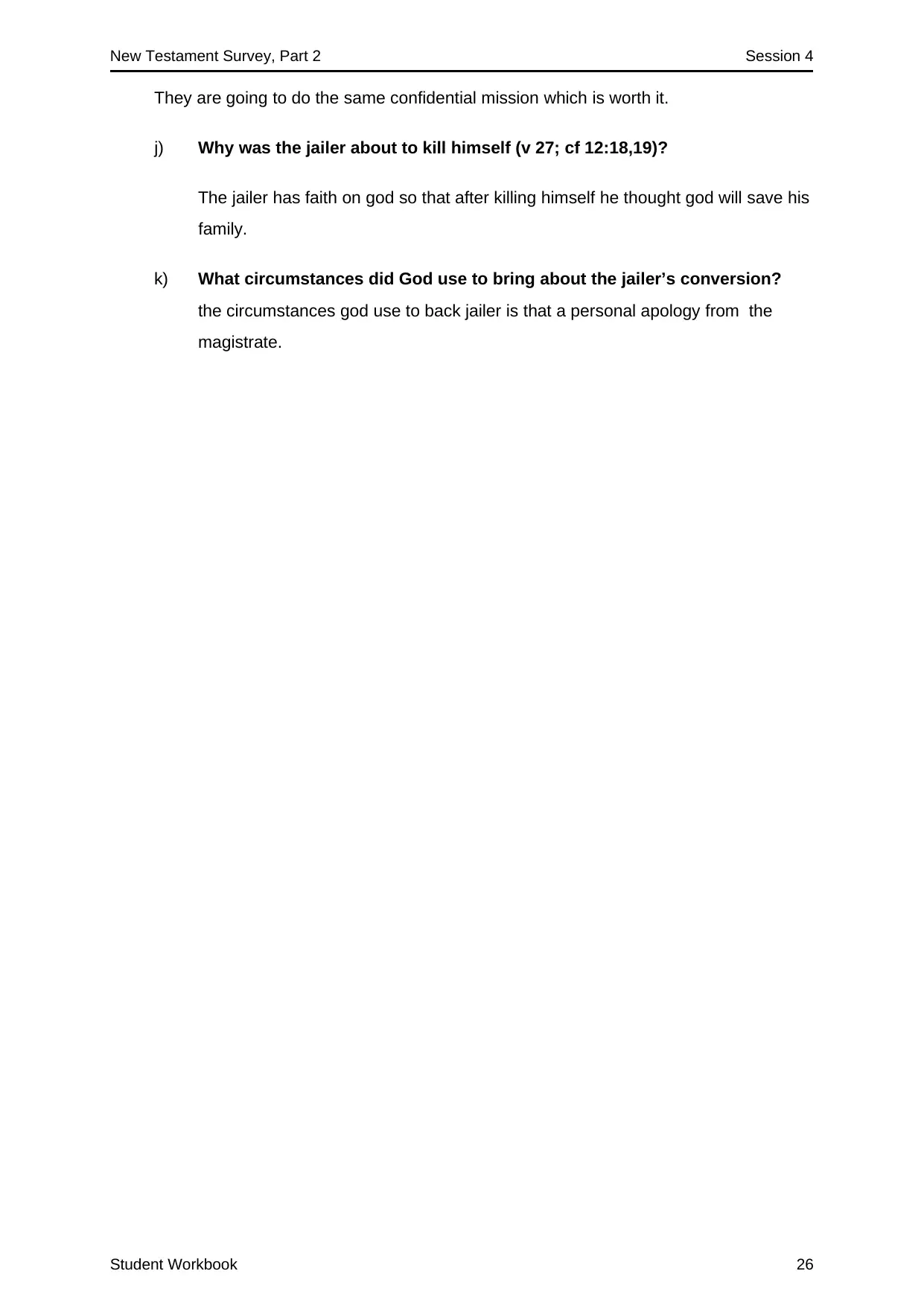
New Testament Survey, Part 2 Session 4
They are going to do the same confidential mission which is worth it.
j) Why was the jailer about to kill himself (v 27; cf 12:18,19)?
The jailer has faith on god so that after killing himself he thought god will save his
family.
k) What circumstances did God use to bring about the jailer’s conversion?
the circumstances god use to back jailer is that a personal apology from the
magistrate.
Student Workbook 26
They are going to do the same confidential mission which is worth it.
j) Why was the jailer about to kill himself (v 27; cf 12:18,19)?
The jailer has faith on god so that after killing himself he thought god will save his
family.
k) What circumstances did God use to bring about the jailer’s conversion?
the circumstances god use to back jailer is that a personal apology from the
magistrate.
Student Workbook 26
⊘ This is a preview!⊘
Do you want full access?
Subscribe today to unlock all pages.

Trusted by 1+ million students worldwide
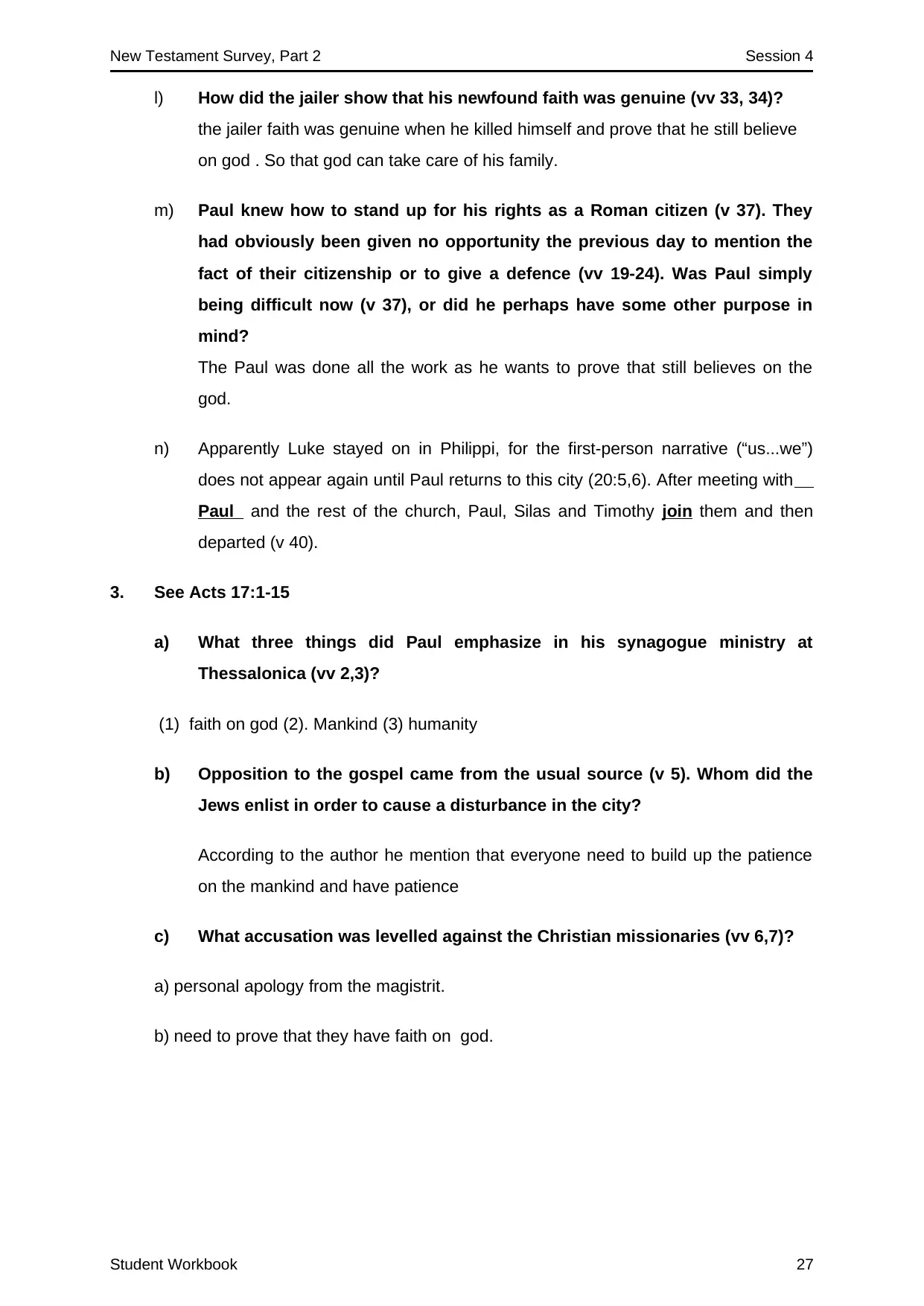
New Testament Survey, Part 2 Session 4
l) How did the jailer show that his newfound faith was genuine (vv 33, 34)?
the jailer faith was genuine when he killed himself and prove that he still believe
on god . So that god can take care of his family.
m) Paul knew how to stand up for his rights as a Roman citizen (v 37). They
had obviously been given no opportunity the previous day to mention the
fact of their citizenship or to give a defence (vv 19-24). Was Paul simply
being difficult now (v 37), or did he perhaps have some other purpose in
mind?
The Paul was done all the work as he wants to prove that still believes on the
god.
n) Apparently Luke stayed on in Philippi, for the first-person narrative (“us...we”)
does not appear again until Paul returns to this city (20:5,6). After meeting with__
Paul_ and the rest of the church, Paul, Silas and Timothy join them and then
departed (v 40).
3. See Acts 17:1-15
a) What three things did Paul emphasize in his synagogue ministry at
Thessalonica (vv 2,3)?
(1) faith on god (2). Mankind (3) humanity
b) Opposition to the gospel came from the usual source (v 5). Whom did the
Jews enlist in order to cause a disturbance in the city?
According to the author he mention that everyone need to build up the patience
on the mankind and have patience
c) What accusation was levelled against the Christian missionaries (vv 6,7)?
a) personal apology from the magistrit.
b) need to prove that they have faith on god.
Student Workbook 27
l) How did the jailer show that his newfound faith was genuine (vv 33, 34)?
the jailer faith was genuine when he killed himself and prove that he still believe
on god . So that god can take care of his family.
m) Paul knew how to stand up for his rights as a Roman citizen (v 37). They
had obviously been given no opportunity the previous day to mention the
fact of their citizenship or to give a defence (vv 19-24). Was Paul simply
being difficult now (v 37), or did he perhaps have some other purpose in
mind?
The Paul was done all the work as he wants to prove that still believes on the
god.
n) Apparently Luke stayed on in Philippi, for the first-person narrative (“us...we”)
does not appear again until Paul returns to this city (20:5,6). After meeting with__
Paul_ and the rest of the church, Paul, Silas and Timothy join them and then
departed (v 40).
3. See Acts 17:1-15
a) What three things did Paul emphasize in his synagogue ministry at
Thessalonica (vv 2,3)?
(1) faith on god (2). Mankind (3) humanity
b) Opposition to the gospel came from the usual source (v 5). Whom did the
Jews enlist in order to cause a disturbance in the city?
According to the author he mention that everyone need to build up the patience
on the mankind and have patience
c) What accusation was levelled against the Christian missionaries (vv 6,7)?
a) personal apology from the magistrit.
b) need to prove that they have faith on god.
Student Workbook 27
Paraphrase This Document
Need a fresh take? Get an instant paraphrase of this document with our AI Paraphraser
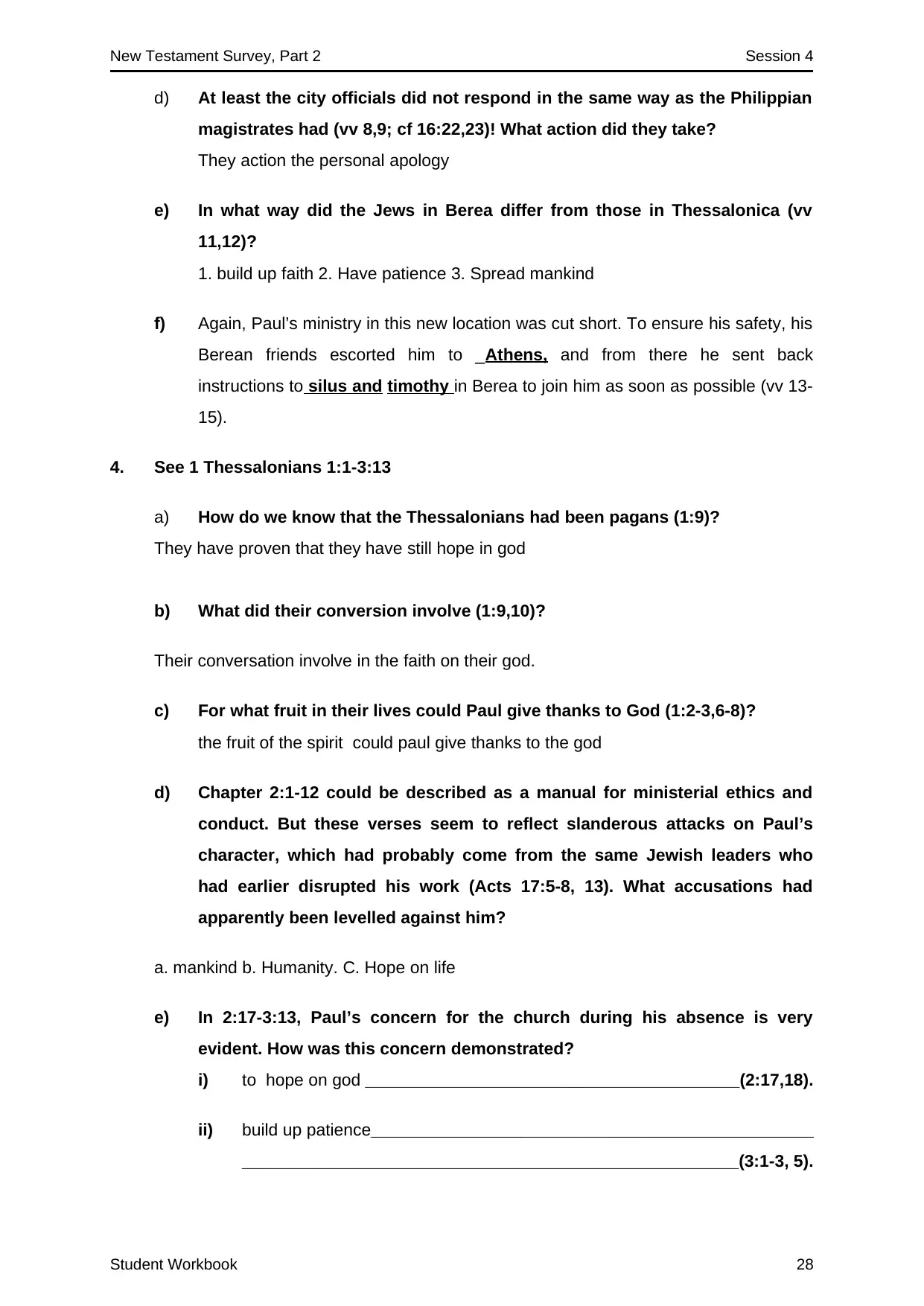
New Testament Survey, Part 2 Session 4
d) At least the city officials did not respond in the same way as the Philippian
magistrates had (vv 8,9; cf 16:22,23)! What action did they take?
They action the personal apology
e) In what way did the Jews in Berea differ from those in Thessalonica (vv
11,12)?
1. build up faith 2. Have patience 3. Spread mankind
f) Again, Paul’s ministry in this new location was cut short. To ensure his safety, his
Berean friends escorted him to _Athens, and from there he sent back
instructions to silus and timothy in Berea to join him as soon as possible (vv 13-
15).
4. See 1 Thessalonians 1:1-3:13
a) How do we know that the Thessalonians had been pagans (1:9)?
They have proven that they have still hope in god
b) What did their conversion involve (1:9,10)?
Their conversation involve in the faith on their god.
c) For what fruit in their lives could Paul give thanks to God (1:2-3,6-8)?
the fruit of the spirit could paul give thanks to the god
d) Chapter 2:1-12 could be described as a manual for ministerial ethics and
conduct. But these verses seem to reflect slanderous attacks on Paul’s
character, which had probably come from the same Jewish leaders who
had earlier disrupted his work (Acts 17:5-8, 13). What accusations had
apparently been levelled against him?
a. mankind b. Humanity. C. Hope on life
e) In 2:17-3:13, Paul’s concern for the church during his absence is very
evident. How was this concern demonstrated?
i) to hope on god ________________________________________(2:17,18).
ii) build up patience_______________________________________________
_____________________________________________________(3:1-3, 5).
Student Workbook 28
d) At least the city officials did not respond in the same way as the Philippian
magistrates had (vv 8,9; cf 16:22,23)! What action did they take?
They action the personal apology
e) In what way did the Jews in Berea differ from those in Thessalonica (vv
11,12)?
1. build up faith 2. Have patience 3. Spread mankind
f) Again, Paul’s ministry in this new location was cut short. To ensure his safety, his
Berean friends escorted him to _Athens, and from there he sent back
instructions to silus and timothy in Berea to join him as soon as possible (vv 13-
15).
4. See 1 Thessalonians 1:1-3:13
a) How do we know that the Thessalonians had been pagans (1:9)?
They have proven that they have still hope in god
b) What did their conversion involve (1:9,10)?
Their conversation involve in the faith on their god.
c) For what fruit in their lives could Paul give thanks to God (1:2-3,6-8)?
the fruit of the spirit could paul give thanks to the god
d) Chapter 2:1-12 could be described as a manual for ministerial ethics and
conduct. But these verses seem to reflect slanderous attacks on Paul’s
character, which had probably come from the same Jewish leaders who
had earlier disrupted his work (Acts 17:5-8, 13). What accusations had
apparently been levelled against him?
a. mankind b. Humanity. C. Hope on life
e) In 2:17-3:13, Paul’s concern for the church during his absence is very
evident. How was this concern demonstrated?
i) to hope on god ________________________________________(2:17,18).
ii) build up patience_______________________________________________
_____________________________________________________(3:1-3, 5).
Student Workbook 28
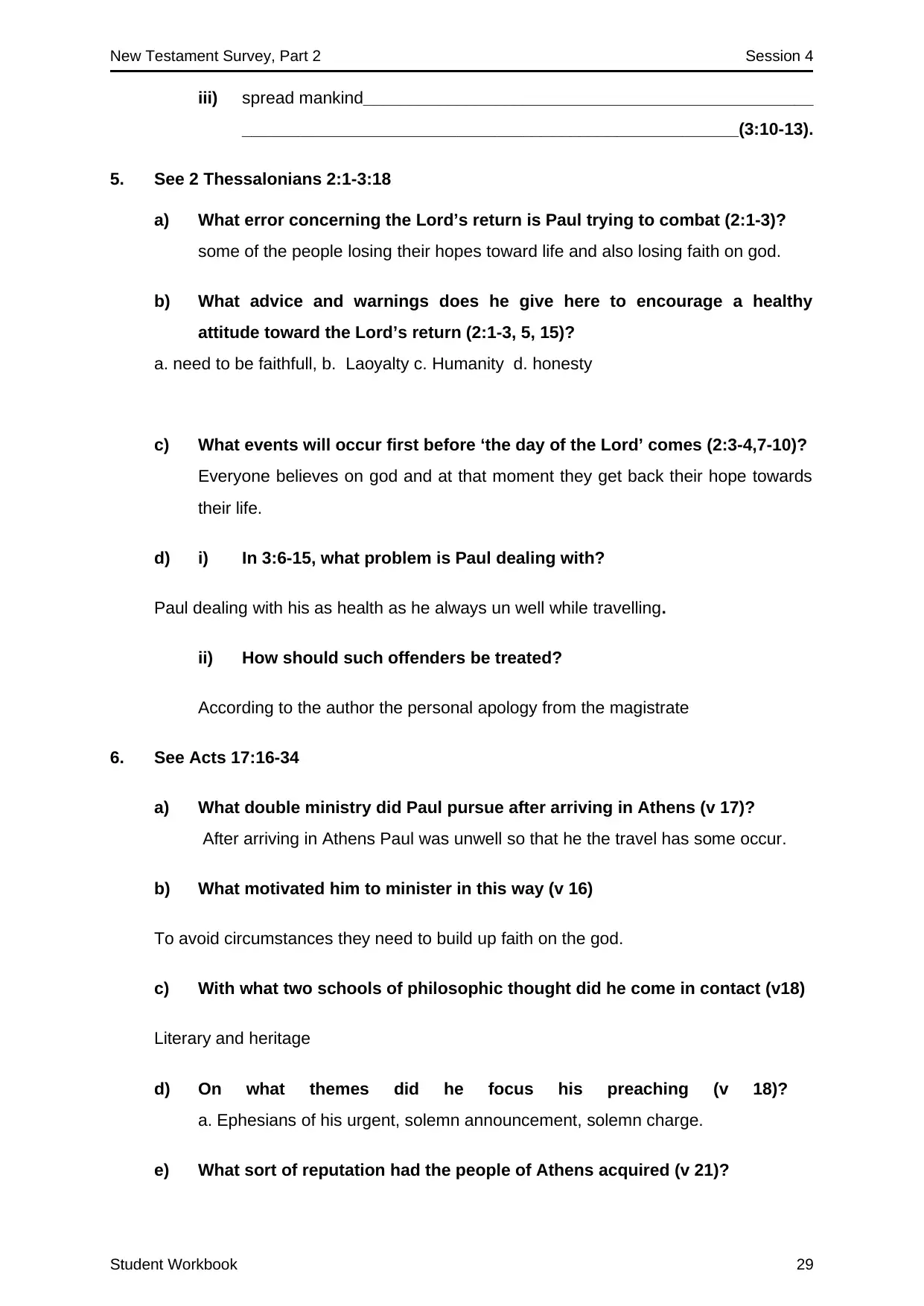
New Testament Survey, Part 2 Session 4
iii) spread mankind________________________________________________
_____________________________________________________(3:10-13).
5. See 2 Thessalonians 2:1-3:18
a) What error concerning the Lord’s return is Paul trying to combat (2:1-3)?
some of the people losing their hopes toward life and also losing faith on god.
b) What advice and warnings does he give here to encourage a healthy
attitude toward the Lord’s return (2:1-3, 5, 15)?
a. need to be faithfull, b. Laoyalty c. Humanity d. honesty
c) What events will occur first before ‘the day of the Lord’ comes (2:3-4,7-10)?
Everyone believes on god and at that moment they get back their hope towards
their life.
d) i) In 3:6-15, what problem is Paul dealing with?
Paul dealing with his as health as he always un well while travelling.
ii) How should such offenders be treated?
According to the author the personal apology from the magistrate
6. See Acts 17:16-34
a) What double ministry did Paul pursue after arriving in Athens (v 17)?
After arriving in Athens Paul was unwell so that he the travel has some occur.
b) What motivated him to minister in this way (v 16)
To avoid circumstances they need to build up faith on the god.
c) With what two schools of philosophic thought did he come in contact (v18)
Literary and heritage
d) On what themes did he focus his preaching (v 18)?
a. Ephesians of his urgent, solemn announcement, solemn charge.
e) What sort of reputation had the people of Athens acquired (v 21)?
Student Workbook 29
iii) spread mankind________________________________________________
_____________________________________________________(3:10-13).
5. See 2 Thessalonians 2:1-3:18
a) What error concerning the Lord’s return is Paul trying to combat (2:1-3)?
some of the people losing their hopes toward life and also losing faith on god.
b) What advice and warnings does he give here to encourage a healthy
attitude toward the Lord’s return (2:1-3, 5, 15)?
a. need to be faithfull, b. Laoyalty c. Humanity d. honesty
c) What events will occur first before ‘the day of the Lord’ comes (2:3-4,7-10)?
Everyone believes on god and at that moment they get back their hope towards
their life.
d) i) In 3:6-15, what problem is Paul dealing with?
Paul dealing with his as health as he always un well while travelling.
ii) How should such offenders be treated?
According to the author the personal apology from the magistrate
6. See Acts 17:16-34
a) What double ministry did Paul pursue after arriving in Athens (v 17)?
After arriving in Athens Paul was unwell so that he the travel has some occur.
b) What motivated him to minister in this way (v 16)
To avoid circumstances they need to build up faith on the god.
c) With what two schools of philosophic thought did he come in contact (v18)
Literary and heritage
d) On what themes did he focus his preaching (v 18)?
a. Ephesians of his urgent, solemn announcement, solemn charge.
e) What sort of reputation had the people of Athens acquired (v 21)?
Student Workbook 29
⊘ This is a preview!⊘
Do you want full access?
Subscribe today to unlock all pages.

Trusted by 1+ million students worldwide
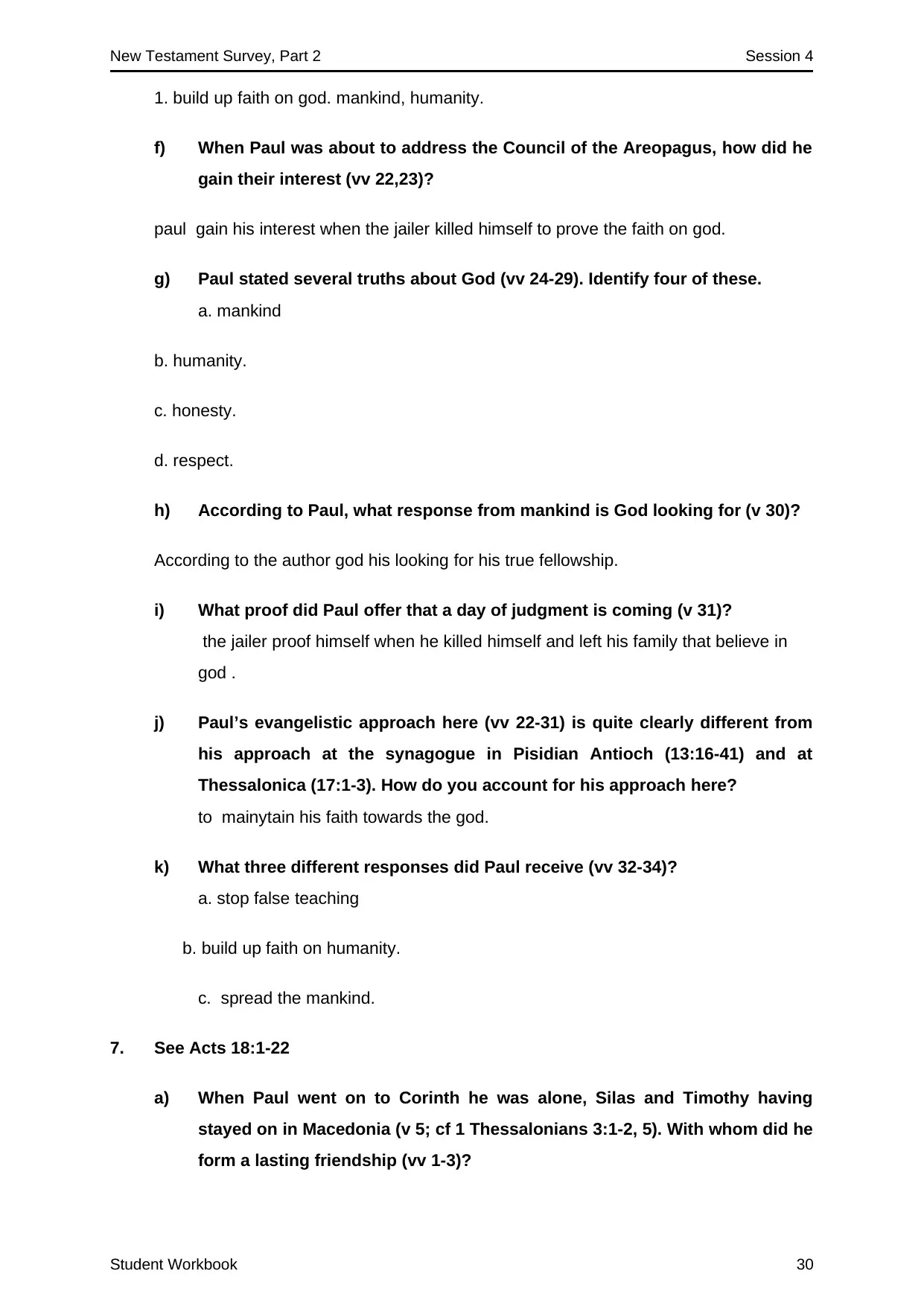
New Testament Survey, Part 2 Session 4
1. build up faith on god. mankind, humanity.
f) When Paul was about to address the Council of the Areopagus, how did he
gain their interest (vv 22,23)?
paul gain his interest when the jailer killed himself to prove the faith on god.
g) Paul stated several truths about God (vv 24-29). Identify four of these.
a. mankind
b. humanity.
c. honesty.
d. respect.
h) According to Paul, what response from mankind is God looking for (v 30)?
According to the author god his looking for his true fellowship.
i) What proof did Paul offer that a day of judgment is coming (v 31)?
the jailer proof himself when he killed himself and left his family that believe in
god .
j) Paul’s evangelistic approach here (vv 22-31) is quite clearly different from
his approach at the synagogue in Pisidian Antioch (13:16-41) and at
Thessalonica (17:1-3). How do you account for his approach here?
to mainytain his faith towards the god.
k) What three different responses did Paul receive (vv 32-34)?
a. stop false teaching
b. build up faith on humanity.
c. spread the mankind.
7. See Acts 18:1-22
a) When Paul went on to Corinth he was alone, Silas and Timothy having
stayed on in Macedonia (v 5; cf 1 Thessalonians 3:1-2, 5). With whom did he
form a lasting friendship (vv 1-3)?
Student Workbook 30
1. build up faith on god. mankind, humanity.
f) When Paul was about to address the Council of the Areopagus, how did he
gain their interest (vv 22,23)?
paul gain his interest when the jailer killed himself to prove the faith on god.
g) Paul stated several truths about God (vv 24-29). Identify four of these.
a. mankind
b. humanity.
c. honesty.
d. respect.
h) According to Paul, what response from mankind is God looking for (v 30)?
According to the author god his looking for his true fellowship.
i) What proof did Paul offer that a day of judgment is coming (v 31)?
the jailer proof himself when he killed himself and left his family that believe in
god .
j) Paul’s evangelistic approach here (vv 22-31) is quite clearly different from
his approach at the synagogue in Pisidian Antioch (13:16-41) and at
Thessalonica (17:1-3). How do you account for his approach here?
to mainytain his faith towards the god.
k) What three different responses did Paul receive (vv 32-34)?
a. stop false teaching
b. build up faith on humanity.
c. spread the mankind.
7. See Acts 18:1-22
a) When Paul went on to Corinth he was alone, Silas and Timothy having
stayed on in Macedonia (v 5; cf 1 Thessalonians 3:1-2, 5). With whom did he
form a lasting friendship (vv 1-3)?
Student Workbook 30
Paraphrase This Document
Need a fresh take? Get an instant paraphrase of this document with our AI Paraphraser
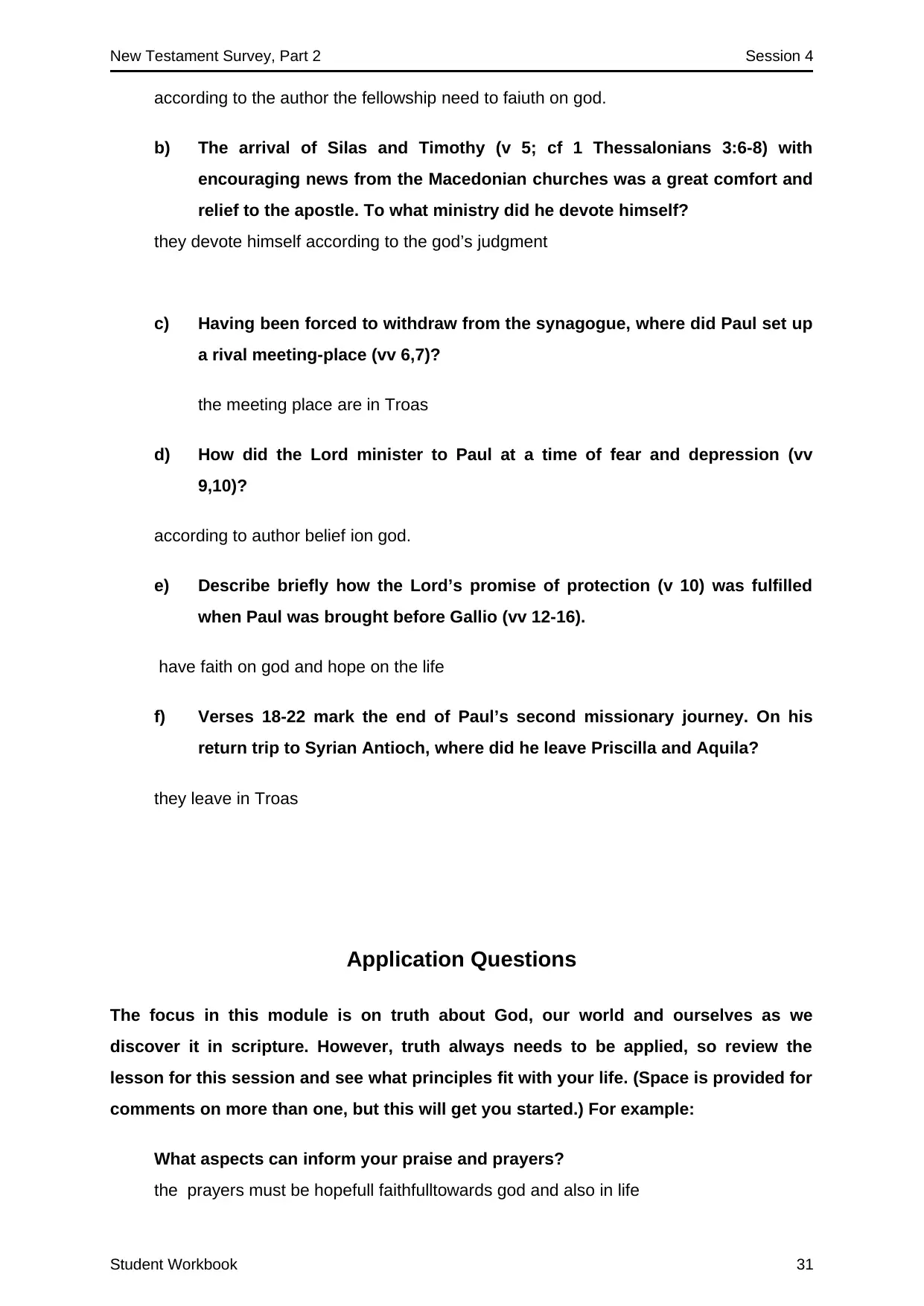
New Testament Survey, Part 2 Session 4
according to the author the fellowship need to faiuth on god.
b) The arrival of Silas and Timothy (v 5; cf 1 Thessalonians 3:6-8) with
encouraging news from the Macedonian churches was a great comfort and
relief to the apostle. To what ministry did he devote himself?
they devote himself according to the god’s judgment
c) Having been forced to withdraw from the synagogue, where did Paul set up
a rival meeting-place (vv 6,7)?
the meeting place are in Troas
d) How did the Lord minister to Paul at a time of fear and depression (vv
9,10)?
according to author belief ion god.
e) Describe briefly how the Lord’s promise of protection (v 10) was fulfilled
when Paul was brought before Gallio (vv 12-16).
have faith on god and hope on the life
f) Verses 18-22 mark the end of Paul’s second missionary journey. On his
return trip to Syrian Antioch, where did he leave Priscilla and Aquila?
they leave in Troas
Application Questions
The focus in this module is on truth about God, our world and ourselves as we
discover it in scripture. However, truth always needs to be applied, so review the
lesson for this session and see what principles fit with your life. (Space is provided for
comments on more than one, but this will get you started.) For example:
What aspects can inform your praise and prayers?
the prayers must be hopefull faithfulltowards god and also in life
Student Workbook 31
according to the author the fellowship need to faiuth on god.
b) The arrival of Silas and Timothy (v 5; cf 1 Thessalonians 3:6-8) with
encouraging news from the Macedonian churches was a great comfort and
relief to the apostle. To what ministry did he devote himself?
they devote himself according to the god’s judgment
c) Having been forced to withdraw from the synagogue, where did Paul set up
a rival meeting-place (vv 6,7)?
the meeting place are in Troas
d) How did the Lord minister to Paul at a time of fear and depression (vv
9,10)?
according to author belief ion god.
e) Describe briefly how the Lord’s promise of protection (v 10) was fulfilled
when Paul was brought before Gallio (vv 12-16).
have faith on god and hope on the life
f) Verses 18-22 mark the end of Paul’s second missionary journey. On his
return trip to Syrian Antioch, where did he leave Priscilla and Aquila?
they leave in Troas
Application Questions
The focus in this module is on truth about God, our world and ourselves as we
discover it in scripture. However, truth always needs to be applied, so review the
lesson for this session and see what principles fit with your life. (Space is provided for
comments on more than one, but this will get you started.) For example:
What aspects can inform your praise and prayers?
the prayers must be hopefull faithfulltowards god and also in life
Student Workbook 31
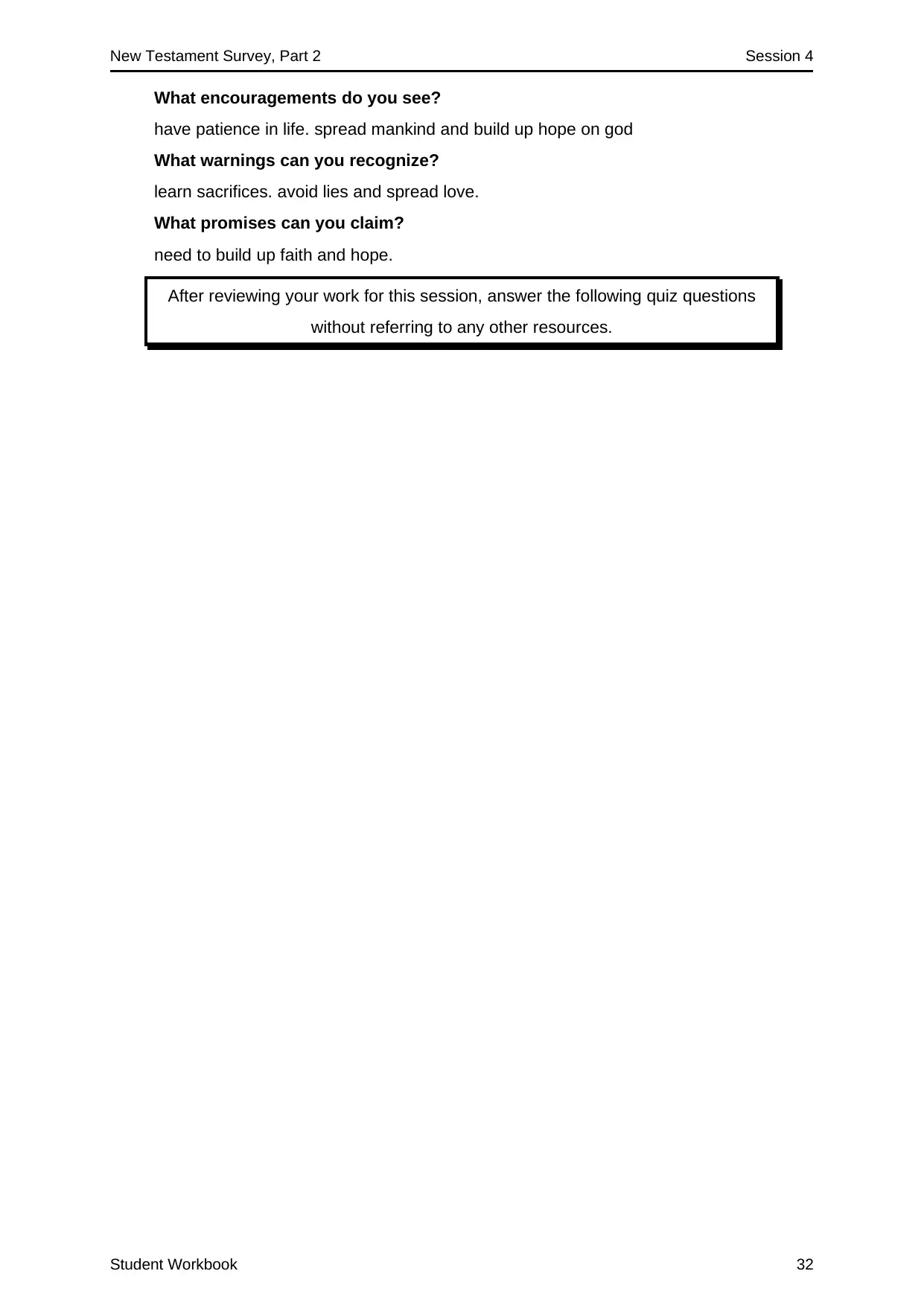
New Testament Survey, Part 2 Session 4
What encouragements do you see?
have patience in life. spread mankind and build up hope on god
What warnings can you recognize?
learn sacrifices. avoid lies and spread love.
What promises can you claim?
need to build up faith and hope.
After reviewing your work for this session, answer the following quiz questions
without referring to any other resources.
Student Workbook 32
What encouragements do you see?
have patience in life. spread mankind and build up hope on god
What warnings can you recognize?
learn sacrifices. avoid lies and spread love.
What promises can you claim?
need to build up faith and hope.
After reviewing your work for this session, answer the following quiz questions
without referring to any other resources.
Student Workbook 32
⊘ This is a preview!⊘
Do you want full access?
Subscribe today to unlock all pages.

Trusted by 1+ million students worldwide
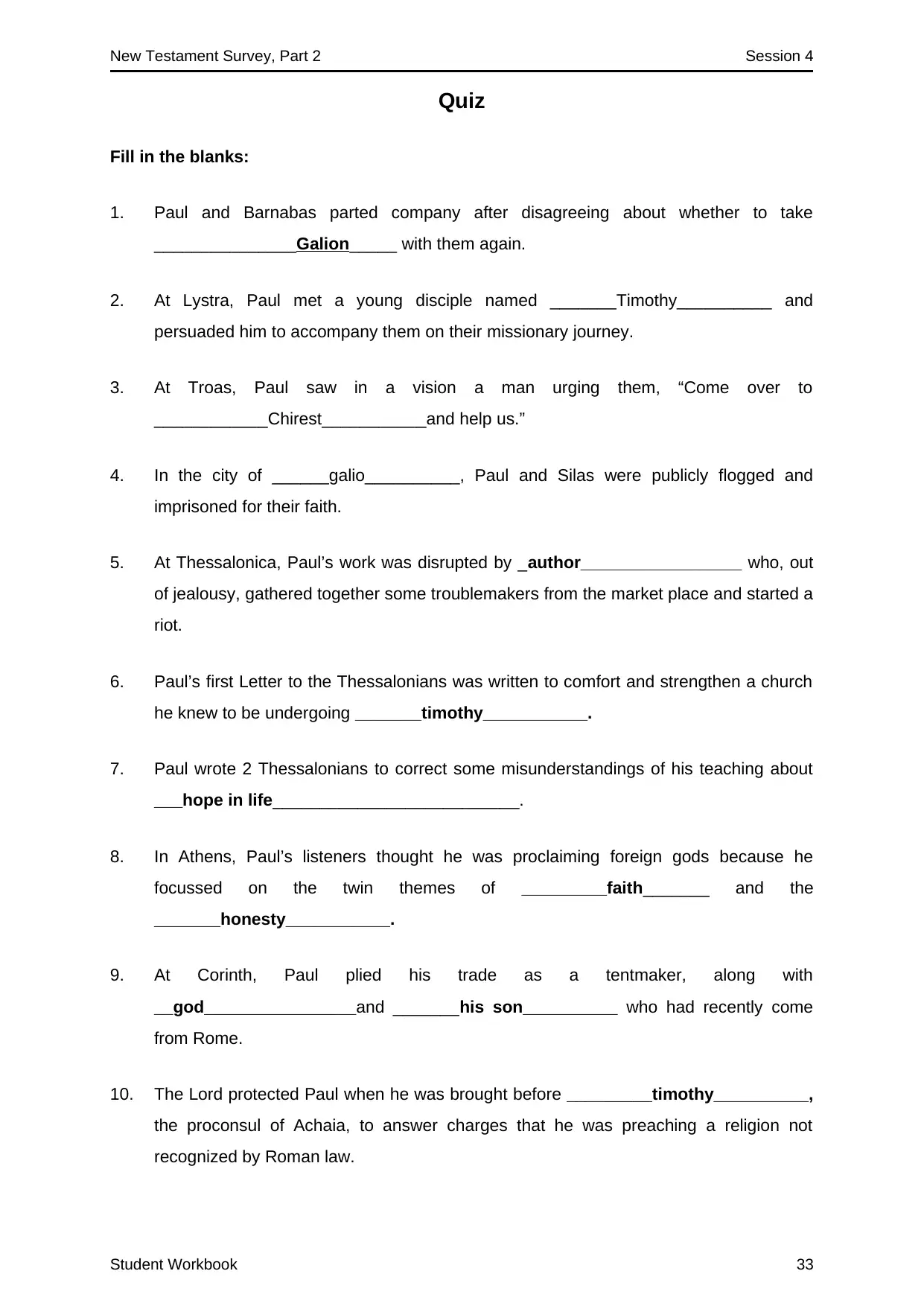
New Testament Survey, Part 2 Session 4
Quiz
Fill in the blanks:
1. Paul and Barnabas parted company after disagreeing about whether to take
_______________Galion_____ with them again.
2. At Lystra, Paul met a young disciple named _______Timothy__________ and
persuaded him to accompany them on their missionary journey.
3. At Troas, Paul saw in a vision a man urging them, “Come over to
____________Chirest___________and help us.”
4. In the city of ______galio__________, Paul and Silas were publicly flogged and
imprisoned for their faith.
5. At Thessalonica, Paul’s work was disrupted by _author_________________ who, out
of jealousy, gathered together some troublemakers from the market place and started a
riot.
6. Paul’s first Letter to the Thessalonians was written to comfort and strengthen a church
he knew to be undergoing _______timothy___________.
7. Paul wrote 2 Thessalonians to correct some misunderstandings of his teaching about
___hope in life__________________________.
8. In Athens, Paul’s listeners thought he was proclaiming foreign gods because he
focussed on the twin themes of _________faith_______ and the
_______honesty___________.
9. At Corinth, Paul plied his trade as a tentmaker, along with
__god________________and _______his son__________ who had recently come
from Rome.
10. The Lord protected Paul when he was brought before _________timothy__________,
the proconsul of Achaia, to answer charges that he was preaching a religion not
recognized by Roman law.
Student Workbook 33
Quiz
Fill in the blanks:
1. Paul and Barnabas parted company after disagreeing about whether to take
_______________Galion_____ with them again.
2. At Lystra, Paul met a young disciple named _______Timothy__________ and
persuaded him to accompany them on their missionary journey.
3. At Troas, Paul saw in a vision a man urging them, “Come over to
____________Chirest___________and help us.”
4. In the city of ______galio__________, Paul and Silas were publicly flogged and
imprisoned for their faith.
5. At Thessalonica, Paul’s work was disrupted by _author_________________ who, out
of jealousy, gathered together some troublemakers from the market place and started a
riot.
6. Paul’s first Letter to the Thessalonians was written to comfort and strengthen a church
he knew to be undergoing _______timothy___________.
7. Paul wrote 2 Thessalonians to correct some misunderstandings of his teaching about
___hope in life__________________________.
8. In Athens, Paul’s listeners thought he was proclaiming foreign gods because he
focussed on the twin themes of _________faith_______ and the
_______honesty___________.
9. At Corinth, Paul plied his trade as a tentmaker, along with
__god________________and _______his son__________ who had recently come
from Rome.
10. The Lord protected Paul when he was brought before _________timothy__________,
the proconsul of Achaia, to answer charges that he was preaching a religion not
recognized by Roman law.
Student Workbook 33
Paraphrase This Document
Need a fresh take? Get an instant paraphrase of this document with our AI Paraphraser

New Testament Survey, Part 2 Session 4
Check your answers at the back of your Workbook.
Student Workbook 34
Check your answers at the back of your Workbook.
Student Workbook 34
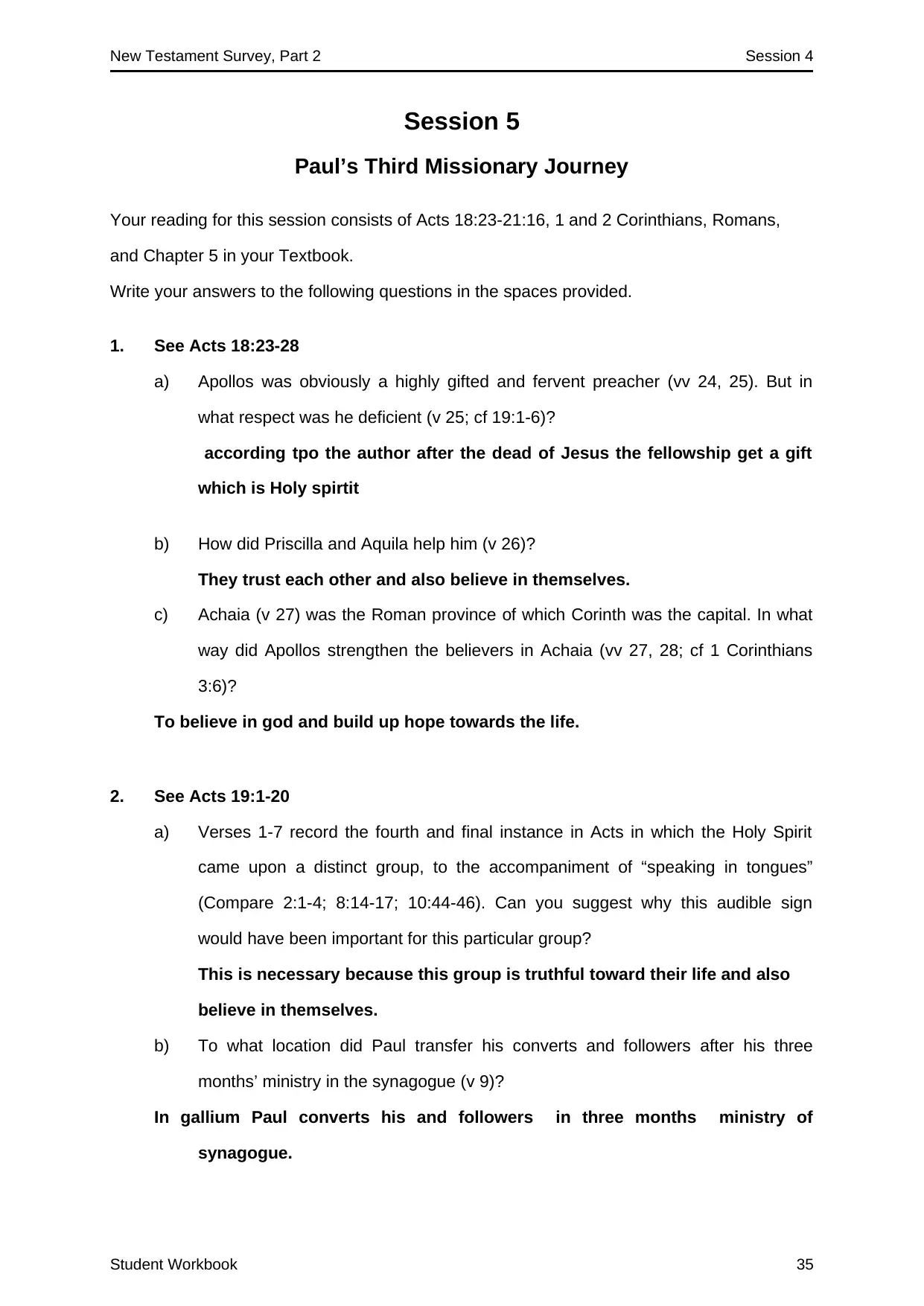
New Testament Survey, Part 2 Session 4
Session 5
Paul’s Third Missionary Journey
Your reading for this session consists of Acts 18:23-21:16, 1 and 2 Corinthians, Romans,
and Chapter 5 in your Textbook.
Write your answers to the following questions in the spaces provided.
1. See Acts 18:23-28
a) Apollos was obviously a highly gifted and fervent preacher (vv 24, 25). But in
what respect was he deficient (v 25; cf 19:1-6)?
according tpo the author after the dead of Jesus the fellowship get a gift
which is Holy spirtit
b) How did Priscilla and Aquila help him (v 26)?
They trust each other and also believe in themselves.
c) Achaia (v 27) was the Roman province of which Corinth was the capital. In what
way did Apollos strengthen the believers in Achaia (vv 27, 28; cf 1 Corinthians
3:6)?
To believe in god and build up hope towards the life.
2. See Acts 19:1-20
a) Verses 1-7 record the fourth and final instance in Acts in which the Holy Spirit
came upon a distinct group, to the accompaniment of “speaking in tongues”
(Compare 2:1-4; 8:14-17; 10:44-46). Can you suggest why this audible sign
would have been important for this particular group?
This is necessary because this group is truthful toward their life and also
believe in themselves.
b) To what location did Paul transfer his converts and followers after his three
months’ ministry in the synagogue (v 9)?
In gallium Paul converts his and followers in three months ministry of
synagogue.
Student Workbook 35
Session 5
Paul’s Third Missionary Journey
Your reading for this session consists of Acts 18:23-21:16, 1 and 2 Corinthians, Romans,
and Chapter 5 in your Textbook.
Write your answers to the following questions in the spaces provided.
1. See Acts 18:23-28
a) Apollos was obviously a highly gifted and fervent preacher (vv 24, 25). But in
what respect was he deficient (v 25; cf 19:1-6)?
according tpo the author after the dead of Jesus the fellowship get a gift
which is Holy spirtit
b) How did Priscilla and Aquila help him (v 26)?
They trust each other and also believe in themselves.
c) Achaia (v 27) was the Roman province of which Corinth was the capital. In what
way did Apollos strengthen the believers in Achaia (vv 27, 28; cf 1 Corinthians
3:6)?
To believe in god and build up hope towards the life.
2. See Acts 19:1-20
a) Verses 1-7 record the fourth and final instance in Acts in which the Holy Spirit
came upon a distinct group, to the accompaniment of “speaking in tongues”
(Compare 2:1-4; 8:14-17; 10:44-46). Can you suggest why this audible sign
would have been important for this particular group?
This is necessary because this group is truthful toward their life and also
believe in themselves.
b) To what location did Paul transfer his converts and followers after his three
months’ ministry in the synagogue (v 9)?
In gallium Paul converts his and followers in three months ministry of
synagogue.
Student Workbook 35
⊘ This is a preview!⊘
Do you want full access?
Subscribe today to unlock all pages.

Trusted by 1+ million students worldwide
1 out of 37
Your All-in-One AI-Powered Toolkit for Academic Success.
+13062052269
info@desklib.com
Available 24*7 on WhatsApp / Email
![[object Object]](/_next/static/media/star-bottom.7253800d.svg)
Unlock your academic potential
Copyright © 2020–2026 A2Z Services. All Rights Reserved. Developed and managed by ZUCOL.
